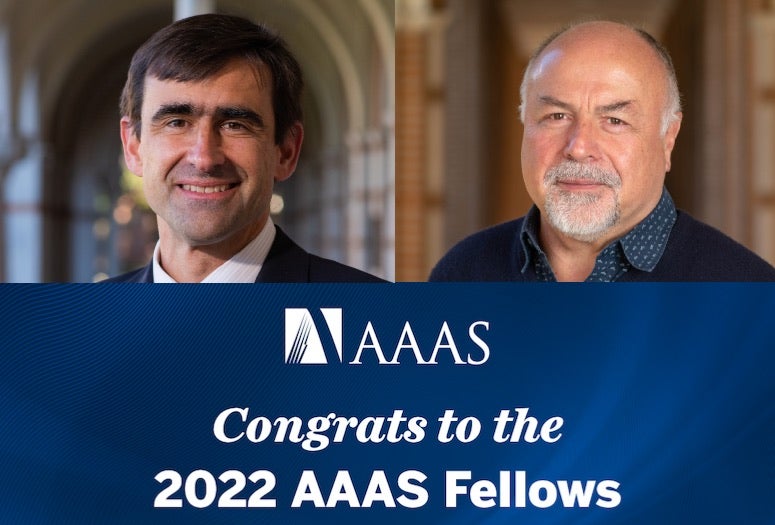Rice University professors Thomas Killian and Marek Kimmel have been named fellows of the American Association for the Advancement of Science (AAAS), the world’s largest general scientific society and the publisher of the journal Science.
The distinction is among the highest in the scientific community — fewer than 1% of AAAS members are elected fellows each year by their peers — and honors scientists, engineers and innovators whose efforts on behalf of science and its applications are scientifically or socially distinguished. Killian and Kimmel are among 508 members of this year’s class.
“Professors Killian and Kimmel are outstanding scholars whose research and vision have helped advance the course of their respective disciplines,” said Rice Provost Amy Dittmar. “They have made a real contribution to Rice, and on behalf of our community I would like to congratulate them both on this tremendous achievement.”

Killian, dean of the Wiess School of Natural Sciences and a professor of physics and astronomy, was recognized for “distinguished contributions to the study of ultracold atoms and plasmas, particularly for advances in quantum degenerate gases and Rydberg atoms of strontium,” according to the AAAS.
“It’s a tremendous honor,” Killian said. “It’s very humbling and meaningful.
“I feel incredibly fortunate to have had the bulk of my career during a time that's been so exciting in what I do, which is the area of ultracold atomic physics,” he added. “At very low temperatures, physics changes and new phenomena emerge.
“Having techniques to cool gases of atoms down to temperatures near absolute zero, mostly with the use of lasers, allows us to observe new phases of matter,” he continued. “We can form exotic types of molecules and can control atoms with such phenomenal precision that we can use the motions of the atoms as new tools for quantum computation or to model systems that are otherwise inaccessible. For example, at low temperatures and on a tabletop, I can create an environment that's similar to, and can teach us about the core of, a white dwarf star.”

Kimmel, a professor and associate department chair of statistics and the Rice director of the Interinstitutional Biostatistics Graduate Program, was recognized for “distinguished contributions to statistical and population genetics, systems biology and stochastic modeling of human diseases, particularly bridging Markov and branching processes (the latter described by Kimmel as “mathematical entities that describe proliferation”) with cell and molecular biology and cancer research,” according to the AAAS.
“One of the things we want to know about human cancers, for instance, is their genealogy,” he said. “Based on the configurations of the mutations that are present in a tumor, we seek to infer more about how they arose and how much time it took. Genetic archeology is what is currently at the forefront of basic theoretical cancer research. Trying to understand the history of tumors could allow us to learn when and how to act so as to prevent a given type of cancer from occurring.
“I am honored by this award, and I would like to take the opportunity to acknowledge my family, and especially my wife,” Kimmel added. “My work always required a lot of tolerance from my family.”
A tradition dating back to 1874, the AAAS fellowship program has recognized notable scientists, engineers and supporters of science over the years such as W.E.B. DuBois, Maria Mitchell, Steven Chu, Ellen Ochoa, Irwin M. Jacobs, Alan Alda, Mae Jemison and Ayanna Howard. The newly elected class will be honored at an in-person celebration in Washington, D.C., this spring.
-30-
- High-resolution IMAGES are available for download at:
-
https://news-network.rice.edu/news/files/2023/01/201130_Killian_Fitlow_LG.jpg
CAPTION: Thomas Killian is dean of the Wiess School of Natural Sciences and a professor of physics and astronomy. (Photo by Jeff Fitlow/Rice University)
https://news-network.rice.edu/news/files/2023/01/230127_Kimmel_Gustavo_LG.jpg
CAPTION: Marek Kimmel is a professor and associate department chair of statistics and the Rice Director of the Interinstitutional Biostatistics Graduate Program.
(Photo by Gustavo Raskosky/Rice University) - Related stories:
-
James Pomerantz named AAAS fellow:
https://news.rice.edu/news/2022/james-pomerantz-named-aaas-fellow
Two Rice University professors elected AAAS fellows:
https://news2.rice.edu/2019/11/26/two-rice-university-professors-elected-aaas-fellows-3/
Rice’s Pasquali elected AAAS fellow:
https://news2.rice.edu/2018/11/27/rices-pasquali-elected-aaas-fellow/
Rice University scientists named AAAS Fellows:
https://news2.rice.edu/2017/11/20/rice-university-scientists-named-aaas-fellows-2/
- Links:
-
Interinstitutional Biostatistics Graduate Program:
https://statistics.rice.edu/academics/graduate/interinstitutional-biostatistics-graduate
Department of Physics and Astronomy: https://physics.rice.edu/
Department of Statistics: https://statistics.rice.edu/
The Killian Research Group: https://ultracold.rice.edu/
Wiess School of Natural Sciences: https://naturalsciences.rice.edu/ - About Rice:
-
Located on a 300-acre forested campus in Houston, Rice University is consistently ranked among the nation’s top 20 universities by U.S. News & World Report. Rice has highly respected schools of Architecture, Business, Continuing Studies, Engineering, Humanities, Music, Natural Sciences and Social Sciences and is home to the Baker Institute for Public Policy. With 4,240 undergraduates and 3,972 graduate students, Rice’s undergraduate student-to-faculty ratio is just under 6-to-1. Its residential college system builds close-knit communities and lifelong friendships, just one reason why Rice is ranked No. 1 for lots of race/class interaction and No. 1 for quality of life by the Princeton Review. Rice is also rated as a best value among private universities by Kiplinger’s Personal Finance.

